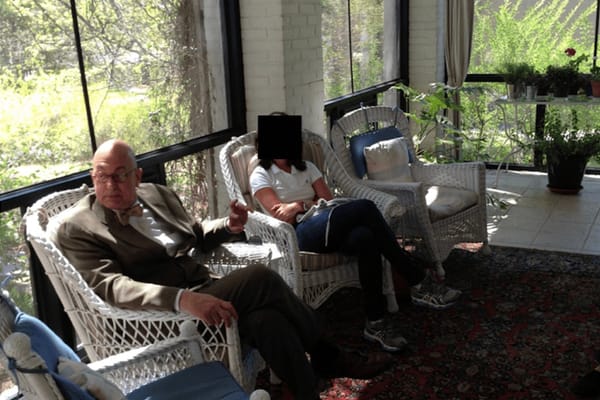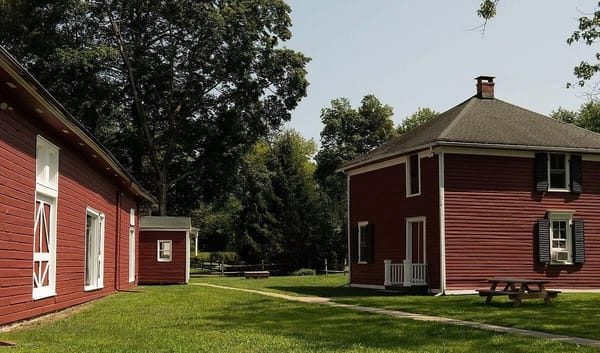
AgriCulture bloggers Peter Davies and Mark Scherzer are the owners of Turkana Farms in Germantown, NY. This week, Mark writes: "The clock is ticking," my father said recently with respect to an impending major birthday. As if I didn't know. His comment should have clued me in to why I am always so aware of what time it is, no matter what activity I'm absorbed in. Well, maybe not no matter what. Weeding in the garden does put me into a sort of Zen state, surprising me when it turns out the afternoon has passed me by. But as a general rule, I'm a time-driven creature. What I've assumed to be personal idiosyncracy turns out not to be one at all. An article in this week's New Yorker described some of the work of David Eagleman, Ph.D, a neuroscientist at Baylor College of Medicine in Houston, who studies "brain time" and other neurological phenomena. Eagleman describes time not as a flowing river, with second following after second, minute after minute, at a uniform rate, but as a human sensation, a matter of perception, in which time slows down in some circumstances (extreme danger and near death experiences) and jumps forward in spurts in others. His theory is that we all have internal clocks constantly ticking within our brains, trying to coordinate all our other sensory inputs into a coherent story of reality. Different people have clocks that run at different rates, it seems. He postulates, moreover, that animals too mark time, though at rates which vary markedly according to species and size. His favorite joke is about a turtle reporting having been mugged by three snails. When asked for details, the turtle replied "I don't know, it all happened so fast."

Thinking of time as an inner sense certainly accords with my experience. My having a clicking inner clock helps explain why it's so hard for me to oversleep and why I don't generally need an alarm to get me up at a particular time. For some reason, Peter has on occasion found it acceptable to nudge me in the middle of the night out of my sleep in order to ask me what time it is. My typical response is to guess the time, then fumble for my watch, and happily report that I guessed pretty close. I doubt such an extreme time consciousness is a universal human trait, but that inner clock must be lurking in everyone at some level. The idea that we and our animals live on different clocks in the same world also struck me as perceptive, again reflecting our experience. Our larger animals' lives seem to proceed at a pace that a New Yorker like me would have to call "deliberate". And when I am in my Manhattan "application of organization to achieve rapid results" mode and they are in their "deliberate" mode we don't mesh well. You can't move fast around the sheep or cows without causing grave upset. Perhaps the old stereotype of farmers who move slowly in all their activities has a great deal to do with their having to move slowly around the animals to avoid that upset, and essentially synchronizing with their livestock's needs, their clock.

I checked out Eagleman's website, and found even his popular science essays too dense to absorb on first reading. But from the New Yorker article I gleaned that one of his areas of study is a sort of synchronization that has to happen between humans who might have slightly different clocks. I would say that is pretty likely the case, because I think there's some way in which the animals and I are communicating our respective clocks and synchronizing to each other as well. On summer evenings, if we have a social engagement requiring us to leave at a particular time, I am often tempted to try to hurry the process of moving the animals into their night quarters. But I've learned that even before I've started the process the turkeys, for example, seem to sense my urgency, and actively resist it. The turkeys cooperate only if the pace they sense is the normal one—their pace. Our unconscious communication is not only about matters of pacing. One year, when we were displaying our turkeys at the County Fair, Peter had to round up some birds of a particular breed that had been banded (certified salmonella-free). We had three varieties, but he had already captured the necessary Bourbon Red and Naragansett. He only needed to nab the Royal Palms. He approached the flock of turkeys, but the Royal Palms (and only the Royal Palms) disappeared. The whole group of them were eventually discovered clustered together under cover of shrubbery adjacent to the sheep pen. Meanwhile, the other two breeds, the Bourbon Reds and Naragansetts, wandered about unconcerned. Somehow the Royal Palms knew what he was looking for. Similarly, when it's time to trim the sheep's hooves, and I am choosing the next ewe to do from among the milling group in the barn, they always seem to sense which one I have my eye on. The object of my hunt will generally start moving frantically away, while many of the others calmly stand watching, letting me pass. Once I've actually caught the ewe and manouevered her backwards into the sort of reclining chair where we immobilize them on their backs in order to trim their hooves, a converse sort of communication happens. That is, they sense when I am not concentrating, and as soon as my attention wanders (say, from holding them in the position we want them) they immediately take advantage. This must be the sort of psychic communication that passes between hunter and prey.

It seems remarkable, even science fiction-like, that there could be this kind of silent inter-species communication, but while I at one time might have laughed off Eagleman's theories as the product of an overactive imagination, I now do not doubt the reality of the phenomenon of silent synchronization he postulates. It seems I remember reading about synchronized group menstrual cycles in both animals and humans, and these sorts of communication seem to fit in that mold. This all makes me wonder whether the animals, too, have awareness of milestones like birthdays, schedules, time to get up, and the value of time. Is there a difference between sensing time in units or simply as a continuing flow? Something about farming initially seemed to me to be an escape from the tyranny of the ticking clock of time. Little did I suspect that it would instead introduce me to hundreds of different, if thankfully slower, clocks. For the complete archive of past AgriCulture blogs, click here.








